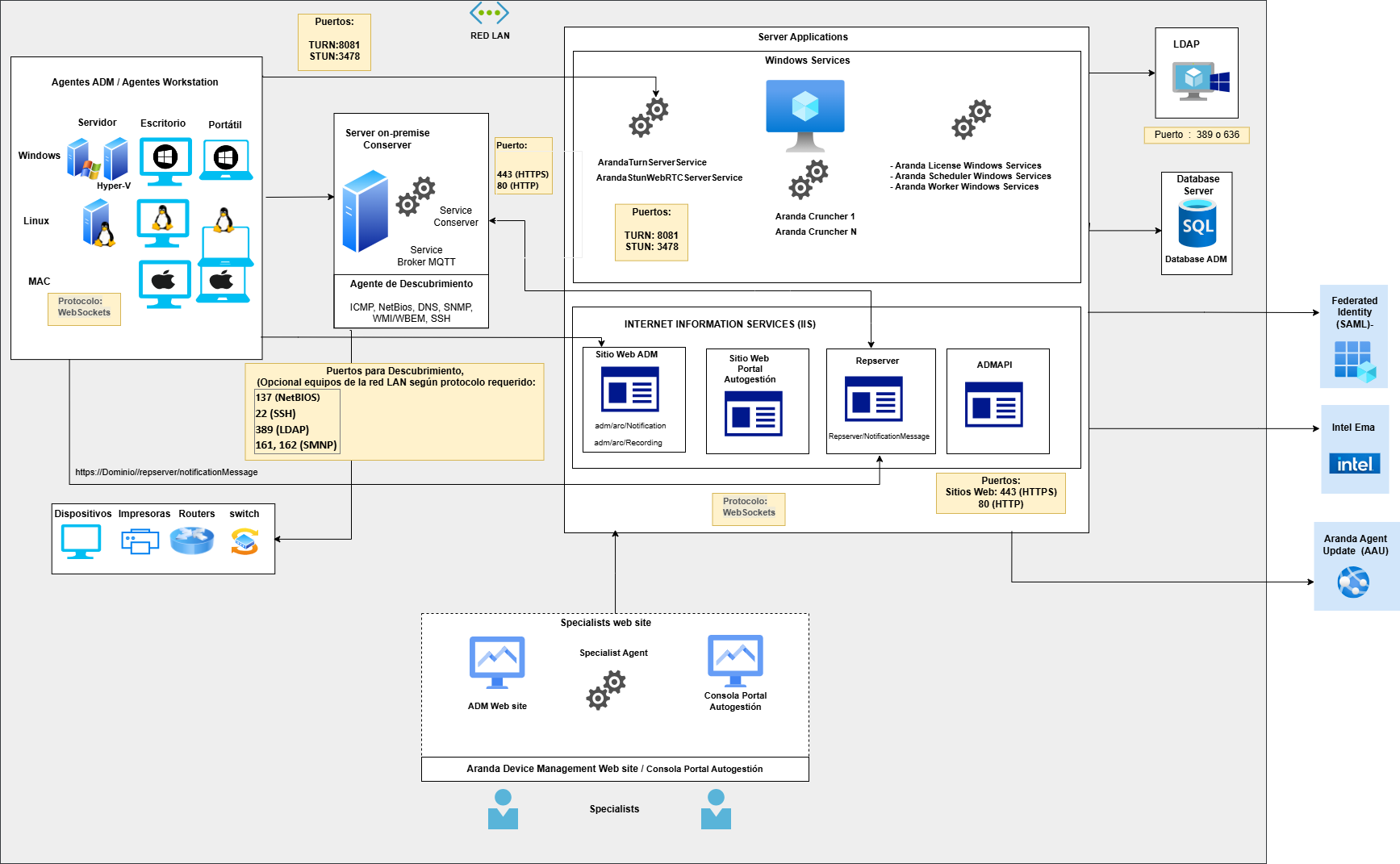The structure and operation of Aranda Device Management ADM is an application distributed in the following components:

Database (server in the client’s infrastructure)
Repository where all system information is stored. The database stores hardware, software, and file inventory information for all workstations.
Application Server
This server hosted in the Aranda cloud contains the business logic, as well as the Mailer, Worker and Cruncher modules. Additionally, it communicates with the Web Console to display the information contained in the Database there.
Preserve
The Conserver acts as a link between the application server components and the client’s LAN. This is a Windows service that must be located on the LAN network in order to send and receive messages from the agents installed on each machine facilitates the processes of discovery, distribution, and remote management. Depending on the topology, a Conserver must be installed for each network segment.
Cruncher
Service installed on the server where the console is installed, is responsible for processing the inventories and saving them in the database. To do this, it decrypts, decompresses, and stores the data collected by each station. There are 2 crunchers:
ADM Agent
The Aranda Device Management agent is the component installed on the customer’s devices it is responsible for generating, compressing, encrypting and sending via TCP/IP the hardware and software inventory in each of the workstations; it also allows the generation of inventories and the secure management of commands from the server.
This component is installed on the client side. It can be installed locally and/or remotely on each workstation.
Repserver
This component is installed on the application server and is responsible for receiving requests from the client’s LAN network or from computers that are directly connected through the Internet.
Web Server Repserver
This component is installed on the application server and contains the Internet Information Services IIS and .Net Framework, on which the application for the Administration Web Console is installed.
Web Console
Through this interface that the customer, user or administrator visualizes, they will be able to manage and view hardware and software inventories by workstation, track and control their IT resources, perform remote control tasks.
Self-Management Portal
This interface that the client visualizes, allows the users responsible for the devices to visualize the available software distribution projects and perform the installation in an unattended manner.
Broker MQTT
This service, located on the customer’s LAN network, allows you to manage and control the messaging actions sent to the web console in real time.
It facilitates communication with the different devices that are being managed, it allows requests to the devices to arrive in real time, for the communications of the devices within the business LAN network, the service can be installed on the server of the conserver or another server that is on the LAN network, it is necessary to open port 1884 or 1883.
Turn Server
When two devices are unable to establish a direct connection to each other, a Turn server is needed to facilitate communication.
It is a Windows service installed in a virtual machine, which acts as a bridge for remote control between the specialist agent and the workstation agent. To activate this functionality, both agents establish a connection with the Turn Server, which is listening on port 8081 or the parameterized for operation on Onpremises, transmitting the data from one agent to the other. (Cloud, defined listening port 3478)
Specialist Agent
It is designed to allow remote control access, file transfers, and recordings for audits. Each specialist must install this application on the machine where he works.
Workstation Agent
Component installed on Windows devices in architectures, they are responsible for receiving remote support. It can be located both inside and outside the customer’s infrastructure.
Harbours
Communication ports used by Aranda Device Management (ADM) to enable required communications.


